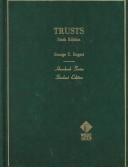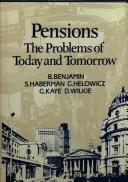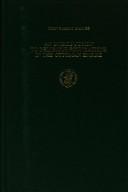| Listing 1 - 10 of 51 | << page >> |
Sort by
|
Book
ISBN: 040640593X Year: 1987 Publisher: London : Butterworths,
Abstract | Keywords | Export | Availability | Bookmark
 Loading...
Loading...Choose an application
- Reference Manager
- EndNote
- RefWorks (Direct export to RefWorks)

ISBN: 031435140X Year: 1987 Publisher: Saint Paul West publishing co.
Abstract | Keywords | Export | Availability | Bookmark
 Loading...
Loading...Choose an application
- Reference Manager
- EndNote
- RefWorks (Direct export to RefWorks)
Book
ISBN: 9004451021 Year: 1987 Publisher: Leiden : Brill,
Abstract | Keywords | Export | Availability | Bookmark
 Loading...
Loading...Choose an application
- Reference Manager
- EndNote
- RefWorks (Direct export to RefWorks)
There has hitherto been no overview of the Islamic institution of vakif (pl. evkaf) from its beginnings until the present century - this book is intended to fill that gap. The author sets the scene by considering various views on the origins of vakif and the legal conditions which defined it. He then deals with the question of whether conquered lands may legally be held as private property in Islam, and concludes that they may not. This is of particular relevance since the geographic scope of the study is the area covered by the Ottoman Empire - an entity existing as a result of conquest - and it was under the Ottomans that the institution of vakif was most fully developed. It was in the reign of Suleyman I, during the tenure of the office of seyhulislam by the formidable legist Ebussuud, that the law concerning evkaf was formalised. Following the logic of introducing the miri land system into Rumeli and Anatolia, an action he sought to justify by proposing its similarity to seriat provisions on land tenure, Ebussuud rendered it lawful to exact dues on vakif property. Mehmed IPs earlier attempt to seize such property for the state had demonstrated the political unacceptability of such a bold act - instead, evkaf property, which had come to be regarded as private, was not threatened by Ebussuud, but the taxing of revenues was allowed. The subsequent history of Ottoman evkaf is the story of the struggle between the state and the beneficiaries of the charitable foundations for control over the use of the revenues. -- From http://www.jstor.org/ (July 6; 2012.).
Book
Year: 1987 Publisher: Cambridge, Mass. National Bureau of Economic Research
Abstract | Keywords | Export | Availability | Bookmark
 Loading...
Loading...Choose an application
- Reference Manager
- EndNote
- RefWorks (Direct export to RefWorks)
This study estimates the magnitude of pension wealth and compares pension wealth to net worth for households in the 1983 Survey of Consumer Finance (SCF). The SCF is the first data set to provide detailed information on both household finances and pension characteristics. The pension information is provided by the employer, so that it is much more detailed and likely to be more accurate than the pension data used in previous studies. Pension wealth was estimated under two sets of assumptions. Under the projected earnings approach, mean pension wealth is $98,291, which represents 43 percent of mean net worth for households with pensions. Under the legal method of calculating pension wealth, mean pension wealth is $47,541, which represents 26 percent of mean net worth for households with pensions. Both estimates are much larger than those obtained in earlier studies. The study also examines how estimates of inequality in the wealth distribution change when pension wealth is added to household balance sheets. Using a variety of methods and assumptions, the distribution becomes more equal when the definition of wealth is expanded to include pension assets.
Book
Year: 1987 Publisher: Cambridge, Mass. National Bureau of Economic Research
Abstract | Keywords | Export | Availability | Bookmark
 Loading...
Loading...Choose an application
- Reference Manager
- EndNote
- RefWorks (Direct export to RefWorks)
This paper evaluates the quality of workers' information regarding pension offerings using both administrative records and worker reports of pension provisions. Missing and misinformation proves to be widespread. Unionized employees, higher income workers and those in large firms, the better educated, and those with greater seniority are better informed about their pensions. There are also demographic differences: nonwhites have less pension knowledge than whites, but women are better informed than men along several pension dimensions. Myopia about pension incentive structures is troubling since workers may save or consume suboptimally, change jobs, or retire earlier than they would have if equipped with better pension information. The prevalence of missing data should also be troubling to empirical pension analysts using data sets reporting workers' assessments of pension provisions.
Book
ISBN: 0471854395 Year: 1987 Publisher: New York (N.Y.) : Wiley,
Abstract | Keywords | Export | Availability | Bookmark
 Loading...
Loading...Choose an application
- Reference Manager
- EndNote
- RefWorks (Direct export to RefWorks)
Book
Year: 1987 Publisher: Washington, District of Columbia : United States Congressional Budget Office,
Abstract | Keywords | Export | Availability | Bookmark
 Loading...
Loading...Choose an application
- Reference Manager
- EndNote
- RefWorks (Direct export to RefWorks)
Pensions --- Pension trusts. --- Taxation. --- United States.

ISBN: 0043321275 Year: 1987 Publisher: London Allen and Unwin
Abstract | Keywords | Export | Availability | Bookmark
 Loading...
Loading...Choose an application
- Reference Manager
- EndNote
- RefWorks (Direct export to RefWorks)
Old age pensions --- Pensions --- Pension trusts --- Investments
Book
Year: 1987 Publisher: [Washington, D.C.] : United States General Accounting Office,
Abstract | Keywords | Export | Availability | Bookmark
 Loading...
Loading...Choose an application
- Reference Manager
- EndNote
- RefWorks (Direct export to RefWorks)
Unemployment insurance --- Trusts and trustees --- Finance. --- Finance --- Law and legislation

ISBN: 9004086528 9004072896 9004451021 Year: 1987 Publisher: Leiden : E.J. Brill,
Abstract | Keywords | Export | Availability | Bookmark
 Loading...
Loading...Choose an application
- Reference Manager
- EndNote
- RefWorks (Direct export to RefWorks)
Charitable uses, trusts, and foundations (Islamic law) --- Religious trusts --- Fondations (Droit islamique) --- Fondations pieuses --- Turkey --- Turquie --- Religion. --- Religion
| Listing 1 - 10 of 51 | << page >> |
Sort by
|

 Search
Search Feedback
Feedback About UniCat
About UniCat  Help
Help News
News